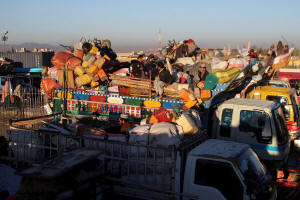|
Many Afghans have opted to go home voluntarily to avoid
deportation under a government push for undocumented migrants to
be expelled. Pakistan's move affects more than 1 million
Afghans, many of whom Islamabad says have been involved in
militant attacks and crime, a claim Kabul rejects.
The new crossings were set up at the Afghan border in
southwestern Balochistan province in addition to the main
crossing in Chaman district, said Jan Achakzai, information
minister for the provincial caretaker government.
The main crossing had been overwhelmed with Afghan refugees
seeking to return home voluntarily, he said.
More than 280,000 Afghan nationals have left Pakistan since the
new policy was announced in early October, according to the
United Nations High Commissioner For Refugees (UNHCR).
Islamabad has begun round-up operations across the country after
the deadline for voluntary departure expired on Nov. 1.
Pakistan has so far rejected calls from the United Nations,
rights groups and Western embassies to reconsider its expulsion
plan or to identify and protect Afghans who risk persecution at
home.
Kabul has also asked Islamabad to give Afghan nationals ample
time to leave.
The expulsion drive has driven relations between the neighbours
to a new low, with Islamabad reiterating its claim that Islamist
militants use Afghan soil to plan and carry out attacks in
Pakistan. Kabul says Pakistan's security is a domestic problem.
The mass migration has also raised fears of a humanitarian
crisis as Kabul grapples with hundreds of thousands of people
arriving and staying in makeshift tent villages on its side of
the border at the onset of winter.
(Writing by Asif Shahzad; Editing by Hugh Lawson)
[© 2023 Thomson Reuters. All rights
reserved.] Copyright 2022 Reuters. All rights reserved. This material may not be published,
broadcast, rewritten or redistributed.
Thompson Reuters is solely responsible for this content.

|
|




